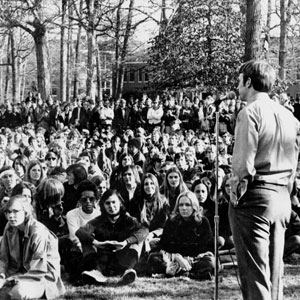
Campus rallies, protests, and demonstrations were not uncommon occurrences during the late 1960s. Civil Rights, the Peace movement, and Women’s liberation prompted many university students to make heartfelt, often impassioned public stands. One of the most publicized and controversial demonstrations at ECU occurred in the spring of 1971 as part of a succession of campus protests against restrictive visitation policies. In many respects, the protests were calls for personal liberty inspired by the sexual revolution of the mid-1960s, a byproduct of widespread use of the birth control pill coupled with the “make love, not war” peace ethic of anti-war activists. The controversy found Chancellor Leo W. Jenkins in uncharacteristically stern opposition to student demands. Unlike his readiness to engage in impromptu, front-door dialogue with frustrated black students in the spring of 1969, when confronted with what appeared to be a mob of mostly white students demanding unlimited visitation rights, Jenkins refused to answer their call and instead simply called the police. In the end, despite harsh resistance to student demands for unlimited visitation privileges and greater personal autonomy, the university’s visitation policy soon fell in line with other campuses, in effect recognizing the new campus morality sweeping the country since the mid-1960s.
Prior to the spring of 1971, ECU visitation policy allowed male and female students to visit each other’s dorm room for several hours three evenings a week. Needless to say, there were many violations. When enforced with student arrests, protests ensued, along with a major campus rally held on the mall attended by over a thousand students. The demand was simple: the students, both male and female, wanted unlimited visitation privileges. Jenkins resisted, much to the anger of the student body. The campus newspaper, The Fountainhead, published a letter complaining about Jenkins’ enforcement of the visitation policy, ending with “F— you, Leo.” For publishing this vulgar letter, the editor of The Fountainhead, Robert Thonen, was suspended from the university. Thonen defended the paper’s decision by appealing to students’ constitutional right to free speech. The Daily Tar Heel, the UNC-Chapel Hill student paper, encouraged ECU students to seek the indictment of Jenkins for conspiring to violate the civil rights of the student body, and even hinted that Hitler would have been proud of such a denial of free expression.
On March 30, student demonstrators chimed in with another major mall rally followed by a march to Jenkins’ residence on Fifth Street. Along the way, some students threw rocks at the Spilman Building where the chancellor’s office was located. Police reported a mall crowd of approximately 2,000. In response, the university requested support from city, county, and state law enforcement officers. The latter, numbering approximately 100, quickly appeared in riot gear, ready to respond to a “near-riot” situation. After being told twice to disperse following their arrival at Jenkins’ residence, thirty-five students were arrested, mostly for disturbing the peace and resisting arrest. Police buses transported the arrested students to city and county jails. The university suspended them, pending their trials.
Earlier, Jenkins had declared “We have no intention of having this institution run by a mob.” When the Board of Trustees met to consider the issue, all visitation privileges were suspended forthwith. Nevertheless, within a year, the harsh reaction was rescinded and visitation policies comparable to other state schools were allowed, effectively granting the students a victory in the struggle for social and personal freedoms. One sad consequence of this struggle for student autonomy was that Chancellor Jenkins, once idolized as a campus leader, came to be vilified at ECU and elsewhere as an advocate of reactionary student life policies.
The student victory, however, was not so much won with demonstrations as with lodging decisions: in the early 1970s, students began to migrate from campus housing to off-campus dwellings proximate the campus, giving them more complete personal autonomy, at least from university regulations. By March 1973, 25% of campus housing was vacant. The message was clear: if students could not have full visitation on campus, they would find it elsewhere. The university responded with the only sensible policy, allowing the students to take charge of, and full responsibility for, their own lives.
Sources
- "35 Youths Arrested at ECU." High Point Enterprise. March 31, 1971. P. 1.
- Bratton, Mary Jo. East Carolina University: The Formative Years, 1907-1982. Greenville: East Carolina Alumnae Association, 1986.
- Cohen, Garry. "ECU No Place to badmouth Leo Jenkins." The Daily Tar Heel. May 12, 1971. P. 8.
- "Dormitory Visitation Policy." Series 16: Students and Campus Events. Box 56 Folders 28-33. Records of Leo Warren Jenkins' Tenure as President and Chancellor, 1960-1978. University Archives # UA02-06. J. Y. Joyner Library. East Carolina University. Greenville, N.C.
- Ferrell, Henry C., Jr. No Time for Ivy: East Carolina University, 1907-2007. Greenville: East Carolina University, 2006. Pp. 135-137.
- Gibson, Garry. "Visitation rally." University Archives # 55.01.0130. J. Y. Joyner Library. East Carolina University. Greenville, N.C. https://digital.lib.ecu.edu/10209
- "Visitation Privileges End at ECU." Rocky Mount Telegram. May 8, 1971. P. 1.
Citation Information
Title: Vsitation Rally
Author: John A. Tucker, PhD
Date of Publication: 7/18/2019